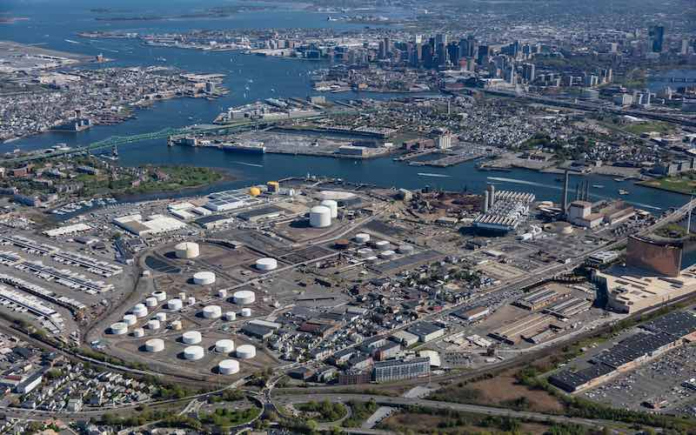
The 1st U.S. Circuit Court of Appeals ruled July 1 that a lawsuit alleging that fossil fuel giant Exxon-Mobil unlawfully failed to prepare an oil storage facility for climate change impacts should go to trial. Conservation Law Foundation, a Massachusetts-based environmental advocacy organization, sued ExxonMobil in September 2016.
The advocacy group argued the behemoth violated the Clean Water Act and the Resource Conservation and Recovery Act by failing to obtain or update permits under those federal laws for its Everett, Mass. terminal, and by not preparing an adequate plan for handling stormwater discharges. Its complaint also claimed that ExxonMobil’s terminal could release pollutants into the Island End and Mystic Rivers and nearby areas in a heavy precipitation or flood event.
A federal judge in Boston indefinitely stayed the lawsuit on grounds that the Environmental Protection Agency should be given an opportunity to renew an expired permit granted to the company in 2009 and that expired in 2014.
“This case involves a rare set [of] circumstances in which deferring to the primary jurisdiction of the EPA is justified and appropriate,” wrote U.S. District Judge Mark Wolf in a March 2020 order. “Under the doctrine of primary jurisdiction, a court may stay claims properly cognizable in court that contain some issue within the special competence of an administrative agency.”
The 1st Circuit found that Wolf’s stay order was an “abuse of discretion.” The veteran federal judge, on the bench since 1985, had to consider “whether the agency determination lies at the heart of the task assigned the agency by Congress;” “whether agency expertise is required to unravel intricate, technical facts; and … whether, though perhaps not determinative, the agency determination would materially aid the court,” wrote Judge O. Rogeriee Thompson for a unanimous panel.
While Wolf correctly applied the first two factors, Thompson explained, he failed to consider that the third one may be entitled to the most weight.
“Whether and on what terms EPA issues the permit for the Everett terminal seems to us largely irrelevant to whether ExxonMobil has violated the conditions of the permit currently in effect,” Thompson wrote. “And it is wholly speculative whether the issuance of the permit will illuminate EPA’s beliefs as to the best climate change models or how good engineers would respond to them, even if it must publish a draft permit, provide detailed explanations for the permit’s conditions, and respond to public comments.”
The 1st Circuit panel also said the stay would not help federal courts to assure “national uniformity of the meaning of terms at issue in ExxonMobil’s permit or the appropriate scope of climate change regulations since EPA is not tasked with interpreting them.”
Wolf previously rejected an ExxonMobil effort to secure dismissal of the entire complaint. If CLF wins the case, he could order ExxonMobil to pay thousands of dollars for each day of violation of the two laws that have occurred since January 2009. CLF said in a news release that it is pursuing similar cases involving oil and gas facilities in New Haven, Conn.; Quincy, Mass.; and Providence, RI.
Oil terminals receive and hold petroleum-based products, including gasoline, kerosene, heating oil, and jet fuel. The tanks at the facility store these substances for later shipment by land transportation systems to other parts of the country.
“Whenever it rains or snows, water rushes off the storage tank roofs and over the facility’s pavement, picking up grime and toxic pollution before pouring into the Mystic,” according to a CLF website. “Daily operations such as maintenance or washing also end up sending contaminated water into the river.”
Among the pollutants in the fossil fuel-based liquids held at oil storage terminals are polycyclic aromatic hydrocarbons. Some PAHs are known carcinogens. After they settle to a lake or river bed when the stormwater carrying them is discharged from the terminal site, they may be agitated to the top of the water column a storm surge.
The case is Conservation Law Foundation v. ExxonMobil Corp., No. 20-1456.
A trial date has not yet been set.

